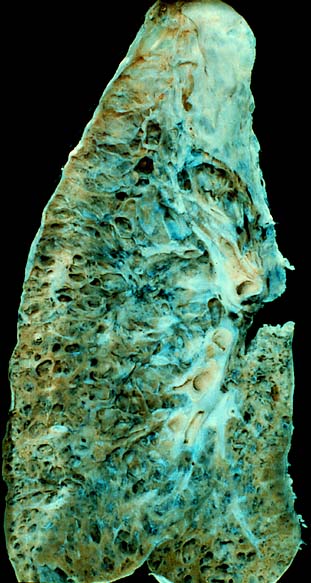Related Research Articles

Arthritis is a term often used to mean any disorder that affects joints. Symptoms generally include joint pain and stiffness. Other symptoms may include redness, warmth, swelling, and decreased range of motion of the affected joints. In some types of arthritis, other organs are also affected. Onset can be gradual or sudden.

Rheumatoid arthritis (RA) is a long-term autoimmune disorder that primarily affects joints. It typically results in warm, swollen, and painful joints. Pain and stiffness often worsen following rest. Most commonly, the wrist and hands are involved, with the same joints typically involved on both sides of the body. The disease may also affect other parts of the body, including skin, eyes, lungs, heart, nerves, and blood. This may result in a low red blood cell count, inflammation around the lungs, and inflammation around the heart. Fever and low energy may also be present. Often, symptoms come on gradually over weeks to months.
Rheumatology is a branch of medicine devoted to the diagnosis and management of disorders whose common feature is inflammation in the bones, muscles, joints, and internal organs. Rheumatology covers more than 100 different complex diseases, collectively known as rheumatic diseases, which includes many forms of arthritis as well as lupus and Sjögren's syndrome. Doctors who have undergone formal training in rheumatology are called rheumatologists.

Etoricoxib, sold under the brand name Arcoxia, is a selective COX-2 inhibitor developed and commercialized by Merck. It is approved in 63 countries worldwide as of 2007, except the United States where the Food and Drug Administration sent a Non Approvable Letter to Merck and required them to provide additional data.

Synovitis is the medical term for inflammation of the synovial membrane. This membrane lines joints that possess cavities, known as synovial joints. The condition is usually painful, particularly when the joint is moved. The joint usually swells due to synovial fluid collection.
Palindromic rheumatism (PR) is a syndrome characterised by recurrent, self-resolving inflammatory attacks in and around the joints, and consists of arthritis or periarticular soft tissue inflammation. The course is often acute onset, with sudden and rapidly developing attacks or flares. There is pain, redness, swelling, and disability of one or multiple joints. The interval between recurrent palindromic attacks and the length of an attack is extremely variable from few hours to days. Attacks may become more frequent with time but there is no joint damage after attacks. It is thought to be an autoimmune disease, possibly an abortive form of rheumatoid arthritis.
Sir Marc Feldmann,, is an Australian-educated British immunologist. He is a professor at the University of Oxford and a senior research fellow at Somerville College, Oxford.

Enteropathic arthropathy commonly referred to as enteropathic arthritis, is a type of arthritis linked to Crohn's disease, ulcerative colitis, and chronic inflammatory bowel diseases.

Antisynthetase syndrome (ASS) is a multisystematic autoimmune disease associated with inflammatory myositis, interstitial lung disease, and antibodies directed against various synthetases of aminoacyl-transfer RNA. Other common symptoms include mechanic's hands, Raynaud's phenomenon, arthritis, and fever.
The Rheumatoid Arthritis Quality of Life Questionnaire (RAQoL) is a disease-specific patient-reported outcome measure which determines the effect rheumatoid arthritis has on a patient's quality of life. The RAQoL has 30 items with a yes and no response format and takes about six minutes to complete.
Claus Manniche is a Danish rheumatologist, Consultant and Professor. His main research interests are clinical databases in back pain and research methodology. He has authored more than 120 journal articles and co-authored several books.
Patient satisfaction is a measure of the extent to which a patient is content with the health care which they received from their health care provider.
Paul-Peter Tak M.D. PhD FMedSci is an immunologist and academic specialising in the fields of internal medicine, rheumatology and immunology. Tak has been the President & CEO of Candel Therapeutics since September 2020.
Eric John Holborow was a British physician, rheumatologist, and immunologist, known for his pioneering research on autoimmunity.

Lars Klareskog is a Swedish physician, immunologist, and rheumatologist, known for research into the genetics of autoimmune diseases such as rheumatoid arthritis (RA).

Rachelle Buchbinder is an Australian rheumatologist and clinical epidemiologist. Her clinical practice is in conjunction with research involving multidisciplinary projects relating to arthritis and musculoskeletal conditions. She promotes improvement of communication with patients and health literacy in the community.

Soumya Raychaudhuri is a professor of medicine and biomedical informatics at Harvard Medical School, and an Institute Member at Broad Institute. He is the JS Coblyn and MB Brenner Distinguished Chair in Rheumatology/Immunology and a practicing rheumatologist at Brigham and Women's Hospital. He is the director for the Center for Data Sciences at Brigham and Harvard. His research focuses on human genetics and computational genomics to understand immune-mediated diseases.
Fiona Marion Florence McQueen is a New Zealand rheumatologist, environmentalist and children's writer, and was a full professor at the University of Auckland before retiring to run a private herbalist practice in Glenorchy in Otago. She was New Zealand's first woman professor of rheumatology.

Josef Smolen is an Austrian rheumatologist and immunologist and professor emeritus at the Medical University of Vienna. Since 2018 he is chairman emeritus of the Department of Internal Medicine 3 and the Division of Rheumatology at the Medical University of Vienna and Vienna General Hospital and was the chairman of the 2nd Medical Department and Center for Diagnosis and Therapy of Rheumatic Diseases at the Lainz Hospital, now the Hietzing Clinic of the Vienna Health Association from 1989 to 2017.
Rebecca Grainger is a New Zealand academic rheumatologist, and is a full professor at the University of Otago, specialising in rheumatoid arthritis and osteoarthritis, and gout. She is also interested in the use of technology for medical education and digital health.
References
- ↑ Quinn, Richard (2012-08-08). "Educational Leader Honored with Top Rheumatology Award".
- ↑ "Rheumatoid arthritis and switching TNFis: an interview with Professor Paul Emery, University of Leeds". News-Medical.net. 2014-03-12. Retrieved 2023-10-07.
- 1 2 "Paul Emery". The Lancet . 358 (9280). 11 August 2001. doi:10.1016/S0140-6736(01)05618-5.
- 1 2 3 "Paul Emery". rheumatology.medicinematters.com. Retrieved 2023-10-07.
- ↑ "Professor Paul Emery OBE FLSW MA MD FRCP FRCPE FMedSci MACR". Leeds Biomedical Research Centre. Retrieved 2023-10-07.
- 1 2 Boyack, Kevin W.; Klavans, Richard; Sorensen, Aaron A.; Ioannidis, John P.A. (December 2013). "A list of highly influential biomedical researchers, 1996–2011". European Journal of Clinical Investigation. 43 (12): 1339–1365. doi: 10.1111/eci.12171 . ISSN 0014-2972.
- ↑ "Publication Analysis 1997–2008: Rheumatology" (PDF). Lab Times. p. 52. Archived from the original (PDF) on 11 July 2017.
- ↑ Gardner, Joshua (2011-03-17). "Prof Emery most highly cited European rheumatologist". Leeds Biomedical Research Centre. Retrieved 2023-10-07.
- ↑ https://www.youtube.com/watch?v=-pzxyWMs7tc
- ↑ "Professor Paul Emery | The Academy of Medical Sciences". acmedsci.ac.uk. Retrieved 2023-10-25.
- ↑ Gransalke, Kathleen. "Rheumatology Publication Analysis 2007-2013". Lab Times. Archived from the original on 16 October 2017.
The most-cited papers in rheumatology research, mentioned earlier, already give us a clue about our highly-cited rheumatologists' favourite research subject. That's right: rheumatoid arthritis. Not less than 24 of our top 30 researchers work exclusively or primarily on this disease. The ranking's number one, Paul Emery, is no exception. In his research, he wants to elucidate RA's immunopathogenesis and immunotherapy. In addition, he studies spondyloarthritis, another rheumatoid inflammatory disease, which can cause the fusion of spinal vertebrae, leading to stiffness and inflexibility.
- ↑ "Expertise in Arthritis, Rheumatoid May 2020".
- ↑ Index, AD Scientific. "Paul Emery - AD Scientific Index 2024". www.adscientificindex.com. Retrieved 2024-05-09.
- ↑ "Colleagues celebrate New Year Honours". forstaff.leeds.ac.uk. Retrieved 2024-01-06.
- ↑ "Dr Benjamin Ellis and Professor Paul Emery named in the 2024 New Years Honours list". Versus Arthritis. Retrieved 2024-01-06.
- ↑ "King's New Year Honours for RCP fellows". RCP London. 2024-01-04. Retrieved 2024-01-06.
- ↑ "Fellows recognised in New Year Honours 2024". acmedsci.ac.uk. Retrieved 2024-01-06.
- ↑ "No. 64269". The London Gazette (Supplement). 30 December 2023. p. N9.
- ↑ Wales, The Learned Society of. "Paul Emery". The Learned Society of Wales. Retrieved 2023-10-07.